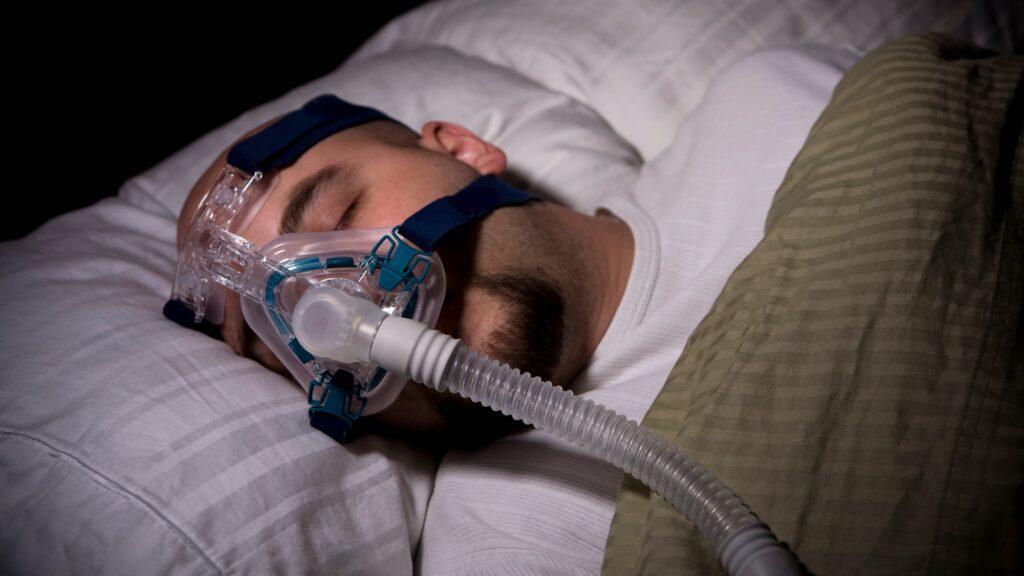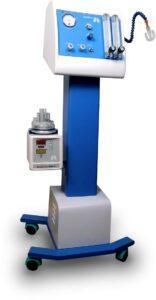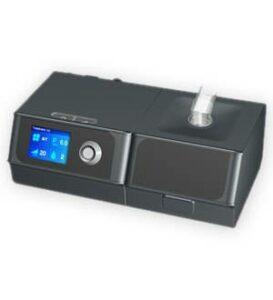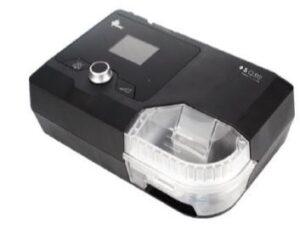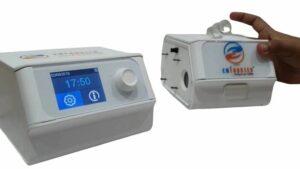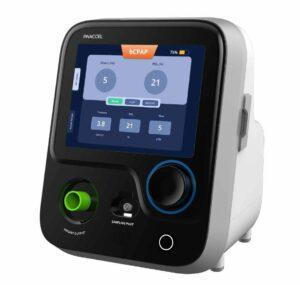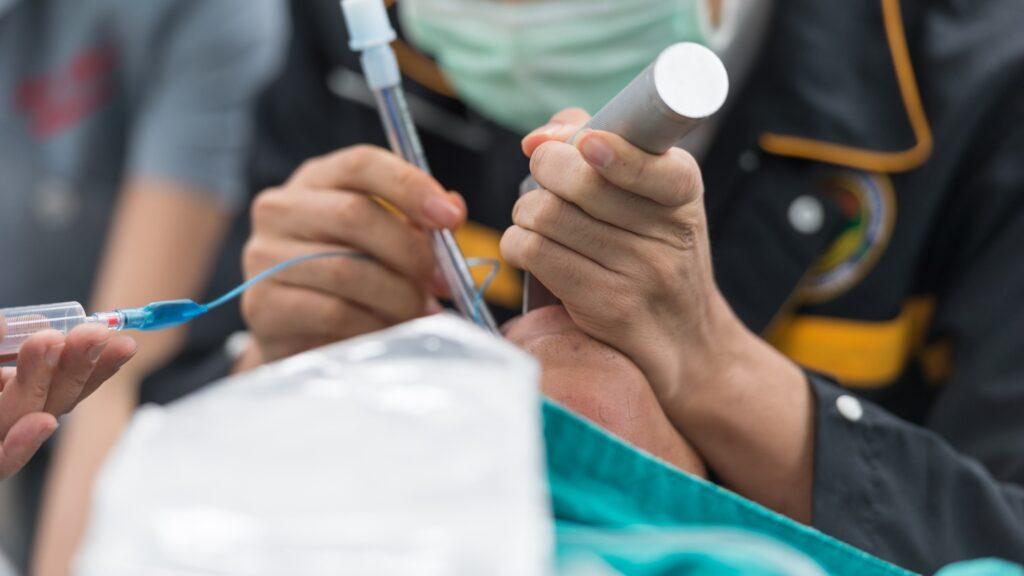If you or a loved one struggle with sleep apnea or other breathing-related issues during sleep you may have come across the term CPAP Machines also called Continuous Positive Airway Pressure machines. These devices have become a vital tool in managing sleep-disordered breathing conditions and improving the quality of sleep.
In this ultimate guide, we will delve into the fundamentals of CPAP machines, demystifying their inner workings and shedding light on their significance in the realm of sleep therapy. We will explore the basic principles behind CPAP machines, explaining how they function to provide a continuous flow of pressurized air to keep your airways open during sleep.
We will also discuss the different components of a CPAP system, from the machine itself to the mask and other accessories, highlighting their roles and importance in delivering effective therapy. Furthermore, we will address common concerns and challenges associated with CPAP therapy, such as mask fitting, maintenance, and adjusting to the therapy. You will find practical tips and strategies to overcome these obstacles and ensure a comfortable and successful CPAP experience.
By the end of this guide, you will have a solid foundation in understanding CPAP machines and their role in managing sleep-disordered breathing conditions. So, let us embark on this comprehensive journey into the world of CPAP machines, unraveling the mysteries and complexities to help you breathe easy and embrace a restful night’s sleep.
Understanding CPAP Machines and Its Working
CPAP (Continuous Positive Airway Pressure) machines are medical devices designed to treat sleep apnea and other sleep-related breathing disorders. They work by delivering a steady flow of pressurized air through a mask worn over the nose or mouth during sleep.
The main objective of a CPAP machine is to prevent the collapse of the airway during sleep which is a common characteristic of sleep apnea. By supplying a continuous stream of air at a prescribed pressure level, CPAP machines create a positive pressure in the airway, keeping it open and allowing for normal breathing patterns.
The working mechanism of a CPAP machine involves a few key components. The machine itself consists of a motor that generates airflow, a filter to clean the incoming air, a humidifier to add moisture if desired, and tubing that connects the machine to the mask. The mask, chosen based on individual preferences and comfort, delivers the pressurized air to the user’s airway.
Once the CPAP machine is turned on, it blows a constant stream of air through the tubing and into the mask. The pressurized air enters the user’s airway, helping to prevent any obstructions or blockages that may occur during sleep. This continuous positive pressure effectively maintains an open airway, allowing for unobstructed breathing and minimizing disruptions throughout the night.
It’s important to note that the pressure level delivered by the CPAP machine is determined by a sleep specialist or healthcare provider after conducting a sleep study or a titration study. The prescribed pressure setting ensures optimal treatment effectiveness and patient comfort.
By using a CPAP machine consistently during sleep individuals with sleep apnea can experience significant improvements in their sleep quality daytime alertness and overall health. Regular usage of the CPAP machine is key to reaping the full benefits of the therapy.
Understanding how CPAP machines work and their essential role in sleep therapy is crucial for individuals seeking treatment for sleep apnea or related breathing disorders. By providing continuous positive airway pressure, CPAP machines can make a profound difference in helping individuals breathe easier, sleep better, and improve their overall well-being.
Types of CPAP Machines
There are several types of CPAP machines available to address varying needs and preferences. Here are some common types:
- Fixed Pressure CPAP Machine: This is the standard CPAP machine that delivers a continuous, fixed pressure throughout the night. The pressure is set by a healthcare professional based on the individual’s sleep study results and specific needs.
- Auto-adjusting CPAP Machine (APAP): Auto-adjusting CPAP machines, also known as APAP or AutoPAP machines, monitor the individual’s breathing patterns and adjust the pressure automatically in response to those patterns. They provide variable pressure levels, delivering the minimum pressure required to keep the airway open, which can enhance comfort and accommodate changes in sleep position and respiratory needs.
- Bi-level Positive Airway Pressure or BiPAP Machine: BiPAP machines also called Bi-level or VPAP machines deliver two different pressure levels a higher pressure during inhalation (IPAP) and a lower pressure during exhalation (EPAP). BiPAP machines are often prescribed for individuals who have difficulty exhaling against a fixed pressure or for those with certain respiratory conditions such as chronic obstructive pulmonary disease (COPD).
- Travel CPAP Machine: Travel CPAP machines are designed to be compact lightweight and portable making them convenient for individuals who frequently travel or need a portable option. These machines often feature reduced size and weight while still providing effective therapy. They may include travel-friendly features like battery operation, universal power compatibility, and easy-to-pack accessories.
- Continuous Positive Airway Pressure with Pressure Relief (CPAP-PR) Machine: CPAP-PR machines offer a combination of CPAP therapy with added pressure relief features. These machines can automatically decrease the pressure during exhalation, making it more comfortable for some individuals and reducing the feeling of breathing against a constant high pressure.
Features of CPAP Machine
CPAP (Continuous Positive Airway Pressure) machines come with various features that enhance comfort, convenience, and effectiveness of therapy. Here are some common features found in CPAP machines:
- Humidifier: Many CPAP machines have integrated humidifiers or offer detachable humidifier units. Humidification helps alleviate dryness and irritation in the airway caused by the airflow, enhancing comfort during therapy.
- Ramp Function: The ramp feature allows the CPAP pressure to start at a lower setting and gradually increase over a set period of time. This gradual pressure increase helps users adjust to the therapy and fall asleep more comfortably.
- Exhalation Pressure Relief: Some CPAP machines offer pressure relief during exhalation. This feature reduces the pressure slightly when the user exhales, making it easier to breathe out against the airflow and increasing overall comfort.
- Data Tracking and Reporting: Many CPAP machines have built-in data tracking capabilities that record usage data, such as the number of hours used, mask leak rates, and apnea events.
- Mask Fit Detection: Certain CPAP machines can detect the fit of the mask and provide feedback or alerts if there are significant leaks. This feature helps users ensure proper mask fitting, which is crucial for effective therapy.
- Auto-Start and Auto-Stop: CPAP machines with auto-start and auto-stop functions automatically begin delivering therapy when the user starts breathing into the mask and stop when the mask is removed. This feature adds convenience and eliminates the need for manual control.
- Mask Type Compatibility: CPAP machines are designed to accommodate different types of masks, including nasal masks, full face masks, nasal pillows, and others. Ensuring mask compatibility allows users to choose the mask style that suits their preferences and needs.
- Portability and Travel-Friendly Features: Travel-specific CPAP machines are designed to be lightweight, compact, and easy to transport. They may have features such as battery operation, universal power compatibility, and travel-friendly accessories for convenience while on the go.
Accessories of CPAP Machine
CPAP (Continuous Positive Airway Pressure) machines are often used in conjunction with various accessories to enhance comfort, convenience, and the overall CPAP therapy experience. Here are some common accessories that can be used with CPAP machines:
- CPAP Masks: CPAP masks come in different styles, such as nasal masks, full face masks, nasal pillows, or hybrid masks. These masks create a seal over the nose, mouth, or both to deliver the pressurized air from the CPAP machine to the airway. Selecting the right mask type and size is crucial for optimal therapy and comfort.
- Mask Cushions and Headgear: Mask cushions are replaceable parts that provide a comfortable seal between the mask and the user’s face. Headgear straps secure the mask in place during sleep. Both cushions and headgear should be regularly cleaned and replaced to maintain proper hygiene and ensure a secure fit.
- Tubing and Connectors: CPAP machines are connected to the mask via tubing, which carries the pressurized air. Tubing length and flexibility can vary, and there are options for heated tubing that helps prevent condensation buildup. Connectors and adaptors may be needed to ensure compatibility between the CPAP machine and mask.
- CPAP Filters: CPAP machines typically have filters to clean the incoming air, removing dust, allergens, and other particles before they reach the user’s airway. Filters need regular cleaning or replacement according to the manufacturer’s instructions to maintain optimal machine performance and air quality.
- Humidifiers: CPAP humidifiers add moisture to the airflow, helping to prevent dryness and irritation in the airway. They can be integrated into the CPAP machine or attached as a detachable unit. Humidifiers often have water chambers that need to be filled and cleaned regularly.
- CPAP Pillows: CPAP pillows are designed with cutouts or contours to accommodate the mask and tubing, providing comfortable positioning for CPAP users who sleep on their side or stomach. These pillows help reduce mask interference and pressure on the face during sleep.
- CPAP Cleaning and Sanitizing Devices: Various cleaning devices and products are available to help users maintain the cleanliness of their CPAP equipment. These include mask wipes, cleaning solutions, mask and hose brushes, and specialized CPAP cleaning machines that use UV light or ozone to sanitize the equipment.
- Travel Accessories: For individuals who frequently travel, there are travel-specific accessories available, such as travel cases, portable battery packs, and universal power adapters. These accessories ensure CPAP therapy can be maintained while on the go.
CPAP Machine Using & Maintenance Tips
Here are some expert tips for using and maintaining your CPAP machine:
- Consistent Use: Use your CPAP machine every time you sleep, including naps. To experience the full benefits of therapy and improve your sleep apnea symptoms.
- Proper Mask Fit: Ensure your mask fits well and creates a secure seal. A properly fitted mask is essential for effective therapy and minimizing air leaks. Adjust the straps and cushion as needed for a comfortable and snug fit.
- Regular Cleaning: Clean your mask, tubing, and humidifier components according to the manufacturer’s instructions. Regular cleaning helps prevent bacteria buildup, extends the lifespan of your equipment, and promotes better hygiene.
- Filter Maintenance: Check and clean or replace the CPAP filters regularly, as recommended by the manufacturer. Clean filters improve air quality and prevent particles from entering the airway.
- Humidifier Usage: If your CPAP machine has a humidifier, use it as directed to alleviate dryness and irritation. Fill the humidifier chamber with distilled water and empty any leftover water after each use to prevent bacteria growth.
- Keep It Elevated: Place your CPAP machine at an elevated level such as a nightstand or table to prevent dust and debris from settling in the machine and obstructing airflow.
- Room Temperature and Noise: Keep your CPAP machine away from extreme temperatures and excessive noise sources. Extreme temperatures can affect machine performance, while excessive noise may disrupt your sleep.
- Travel Considerations: If you travel frequently, invest in a travel-sized CPAP machine or portable options. Ensure you have the necessary power adapters, battery packs, and travel cases to make therapy easier and more convenient on the go.
- Regular Follow-up with Healthcare Provider: Schedule regular follow-up appointments with your healthcare provider to monitor your progress and adjust CPAP settings if needed. They can address any concerns and ensure your therapy remains effective.
- Equipment Replacement: Replace your CPAP mask, tubing, and other components as recommended by the manufacturer or your healthcare provider. Over time, parts may wear out and lose effectiveness, compromising therapy quality.
CPAP Machine Troubleshooting
Here are some troubleshooting tips for common issues with your CPAP machine:
- Mask Leakage: Check if your mask is properly fitted and adjusted. Ensure the straps are secure, and the mask creates a seal over your nose or mouth. Adjust or replace the cushion if necessary.
- Dryness or Irritation: If you experience dryness or nasal irritation, try using a heated humidifier with your CPAP machine. Adjust the humidity level as needed for optimal comfort.
- Claustrophobia or Discomfort: If you feel claustrophobic or uncomfortable wearing the mask try wearing it during the day for short periods to make a habit of it. You can also explore different mask styles or sizes for a better fit.
- Noisy Operation: If your CPAP machine is making unusual noises, check for loose connections or obstructions in the tubing. Clean or replace the filters and ensure the machine is placed on a stable surface.
- Air Pressure Issues: If you experience discomfort from high or low air pressure, consult your healthcare provider. They may need to adjust the pressure settings on your CPAP machine to better suit your needs.
- Dry Mouth: If you wake up with a dry mouth consider using a full face mask or a chin strap to keep your mouth closed during sleep. Alternatively, consult your healthcare provider for potential adjustments to your pressure or humidification settings.
- Excessive Condensation: If you notice excessive condensation in the tubing, consider using a heated tubing option or insulating the tubing with a tubing wrap to prevent the buildup of moisture.
- Power Issues: Check that your CPAP machine is properly plugged in and receiving power. If using a battery pack, ensure it is adequately charged. If power issues persist, consult the manufacturer or your equipment supplier.
- Mask Discomfort: If you experience discomfort or pressure sores from the mask, try using mask liners or cushions to provide a softer surface against your skin. Adjust the headgear straps to reduce pressure points.
- Regular Equipment Maintenance: Follow the manufacturer’s instructions for regular cleaning and maintenance of your CPAP machine. This helps ensure optimal performance and longevity of the equipment.
CPAP Machines From Leading Indian Manufacturers
NeoRes
NeoRes is a CPAP machine manufactured and supplied by Bird Meditech in India. It is a two-in-one valve-based continuous flow system that offers CPAP and IPPR (Intermittent Positive Pressure Respiration) capabilities, along with Bubble CPAP functionality. The device features analog meters for displaying delivered pressure, allowing for easy monitoring.
Gas mixing is achieved through calibrated rotameters, ensuring accurate and controlled air and oxygen blending. The machine is designed with an inlet for oxygen gas, providing additional respiratory support. NeoRes also includes an inbuilt air compressor, eliminating the need for external air sources. With its comprehensive features and reliable performance, NeoRes is an effective solution for managing sleep apnea and respiratory disorders.
Asta Series
Recorders & Medicare Systems Pvt. Ltd. in India manufactures and supplies the Asta Series CPAP machine with Humidifier, which is specifically designed to address sleep disorders and respiratory diseases. The device offers positive airway pressure (PAP) therapy, a well-established treatment approach for these conditions.
The Asta Series CPAP machine is suitable for both home and clinic use, providing versatile therapy options. It operates quietly and includes an audible alert for power failure and tubing/mask leaks, ensuring patient safety and uninterrupted therapy. The machine offers a ramp time of 0 to 60 minutes, allowing for gradual pressure adjustment at the beginning of each session. It also has an automatic airflow start feature that activates when breathing is detected.
The Asta Series CPAP machine includes a removable heated humidifier, offering customizable humidification levels for added comfort during therapy. With its titration facility and sleep lab software compatibility, healthcare professionals can accurately assess therapy effectiveness. The Asta Series CPAP machine is a reliable and user-friendly solution for managing sleep-related breathing disorders.
Auto CPAP
The Auto CPAP machine by Silverline Meditech Pvt. Ltd. is a high-performance device designed to provide effective therapy for sleep apnea, COPD (Chronic Obstructive Pulmonary Disease), asthma, and other respiratory conditions. This portable device offers advanced features to optimize therapy outcomes. The Auto CPAP machine includes an adjustable ramp feature that allows users to start with a lower pressure and gradually increase to the prescribed pressure, promoting comfortable sleep initiation.
It also features an auto-adjusting function that dynamically adapts the pressure delivery based on the individual’s breathing patterns throughout the night, ensuring optimal therapy effectiveness. The machine is equipped with a humidifier that adds moisture to the airflow, preventing dryness and enhancing comfort. Additionally, it includes an oxygen concentrator and a pressure relief system to further improve therapy quality.
The Auto CPAP machine supports wireless monitoring and data storage, allowing healthcare professionals to easily access and analyze patient data for therapy optimization. With its eco-smart warm-up feature and high-efficiency design, this machine reduces water bills and energy consumption, making it a cost-effective solution for medical facilities. The Auto CPAP machine by Silverline Meditech Pvt. Ltd. combines advanced technology, convenience, and comfort to deliver superior respiratory therapy.
Entrusted Delta Sleep A20
The Entrusted Delta Sleep A20 is an auto CPAP machine manufactured by Entrusted Medical Devices, a leading global supplier based in India. This compact and lightweight device is designed to provide effective therapy for sleep apnea and respiratory conditions. The Delta Sleep A20 comes with a detachable heated humidifier and a nasal mask, ensuring optimal comfort during therapy.
The machine offers two years or 5000 running hours of warranty, providing users with peace of mind and long-term reliability. Therapy data, including AHI (Apnea-Hypopnea Index), snoring index, usage hours, P90, and leak, can be easily viewed from the device, which has one-year storage capability for convenient data tracking.The Entrusted Delta Sleep A20 is user-friendly, featuring an ergonomically designed rotary dial for easy input adjustments. It includes real-time therapy data display and offers both automatic and manual CPAP modes for personalized treatment.
The machine also provides expiratory pressure relief, enhancing comfort and adaptability. With a complimentary SD card and powerful data analysis software, users can effectively monitor and manage their therapy progress. The Entrusted Delta Sleep A20 is a reliable, feature-rich auto CPAP machine designed to meet the diverse needs of sleep apnea patients.
SAANS
SAANS is a CPAP machine manufactured and supplied by InnAccel Technologies Pvt. Ltd. in India. This portable and easy-to-use neonatal CPAP device is specifically designed to provide short-term breathing assistance to infants with Respiratory Distress Syndrome (RDS). SAANS is a robust mechanical device that can function independently of infrastructure, making it suitable for low-resource settings.
It is the world’s first manual-powered CPAP device, offering a reliable and affordable solution for breathing support. SAANS is lightweight and features a convenient handle/sling for easy transport. It is compatible with all oxygen sources, standard humidifiers, and interfaces such as masks used for the patient. The device is equipped with a flow generator and a built-in blender to monitor and regulate the pressure, flow, and FiO2 rates accurately.
It includes alarms for FiO2, pressure, flow, and tubing disconnection, ensuring the safety of the neonate. SAANS offers multiple therapy modes, including Neonatal CPAP, Pediatric CPAP, Neonatal HFNC (High Flow Nasal Cannula), and Pediatric CPAP, catering to a range of patient needs. With its innovative design and affordability, SAANS fills a critical gap in neonatal respiratory care, providing essential breathing support in low-resource settings.
Introducing Medzell: A Futuristic B2B Platform for Indian Medical Devices
If you are wondering where to find the best CPAP machines and accessories. Look no further than Medzell, a futuristic B2B platform that promotes Indian medical devices in emerging markets. Medzell provides a comprehensive range of high-quality CPAP machines from reputable manufacturers, ensuring you have access to the latest advancements in sleep apnea therapy.
Medzell connects healthcare providers, distributors, and consumers, offering a seamless procurement experience for CPAP machines and other medical devices. With its user-friendly interface, vast product catalog, and transparent pricing, Medzell simplifies the process of sourcing CPAP machines, making it easier for individuals to find the perfect device for their sleep apnea treatment.
Conclusion
In conclusion, CPAP machines are vital devices for individuals with sleep apnea, providing continuous positive airway pressure to alleviate symptoms and improve overall sleep quality. Understanding the different types of CPAP machines such as fixed pressure, auto-adjusting, and BiPAP machines allows you to choose the one that best suits your individual needs. Additionally, incorporating essential accessories, reading unbiased reviews, and following tips for effective usage and maintenance can enhance the comfort and effectiveness of your sleep apnea therapy.
